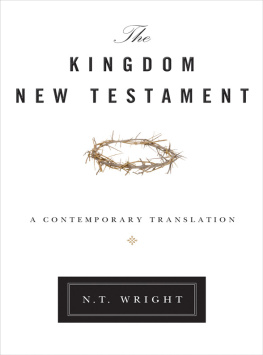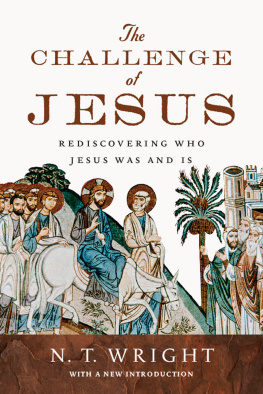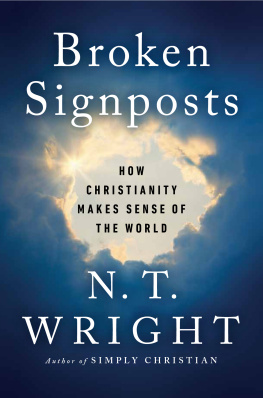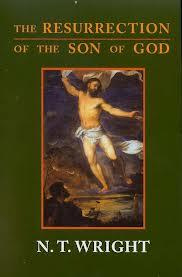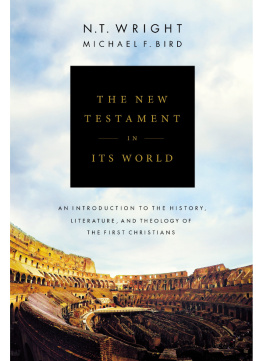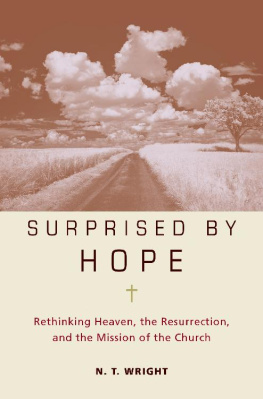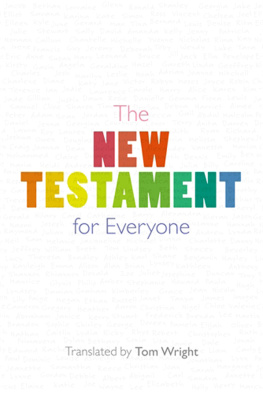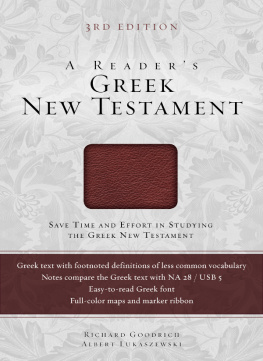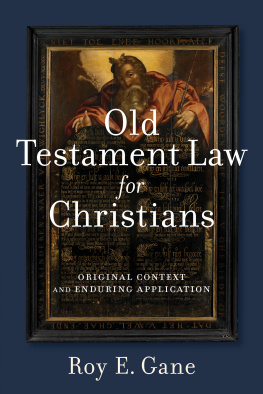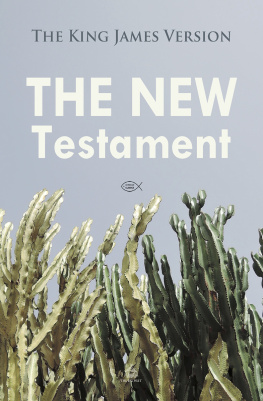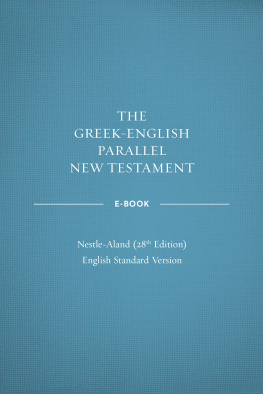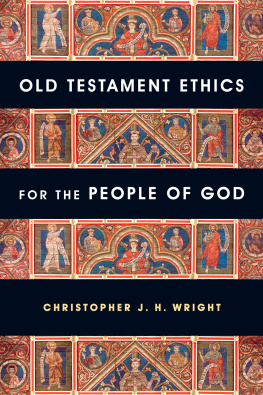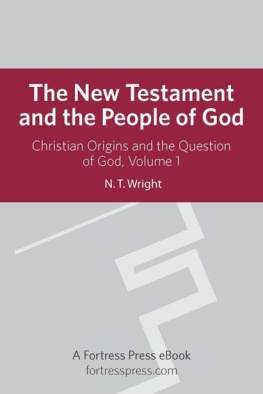The
KINGDOM
NEW TESTAMENT
A CONTEMPORARY TRANSLATION

N. T. Wright

For
Maggie
and
Julian, Rosamund, Harriet, and Oliver
Contents
The first thing that happened in the life of the church was translation . On the day of Pentecost, Gods powerful wind swept through Jesuss followers, filling them, like the sails of a great oceangoing sailing ship, so that they could take Gods good news to the ends of the earth. And they found themselves speaking other languages, so that everyone in the crowd could understand.
Part of the point of Jesuss message, after all, is that its about God coming to people where they are, not sitting back sternly and waiting for them to come to him. Not for nothing does John call Jesus the word of God. Theres no point speaking a word that nobody can understand.
So, right from the start, they translated. Sometimes it happened, as at Pentecost, by the direct action of the holy spirit. Mostly, though, it was through people eagerly turning the message into other languages. Much of the time, Jesus himself spoke Aramaic, an updated dialect of Hebrew, but the gospels were written in Greek. Greek was everybodys second language at the time, a bit like English in many parts of our world today. So, since the message was designed to be good news for everyone, not just native speakers of one language, it was important to translate it. Once begun, the process continued.
It took fifteen hundred years for the whole Bible to appear in English, but once that had happenedparticularly through the work of one of my lifelong heroes, William Tyndale (d. 1536)the idea caught on quickly. Several translations appeared during the sixteenth century, culminating in the King James (Authorized) Version at the start of the seventeenth. And in the twentieth century, too, there have been several new English versions. Some have been quite strict translations, almost word for word; others have been paraphrases, trying to convey the message in a looser, less formal way.
Two questions, then. Is this new version really a translation, or a paraphrase? And why do we need yet another one?
Its a translation, not a paraphrase. I have tried to stick closely to the original. But, as with all translations, even within closely related modern European languages, there are always going to be places where you simply cant do it word by word. To do so would be correct at one level and deeply incorrect at another. There is no safe option: all translation is risky, but its a risk we have to take.
This is particularly so when the language in question is, in the technical sense, dead. Nobody today speaks first-century Greek, so we cant simply phone a native speaker and ask what is meant by a particular phrase. Even if we could do so, theres no guarantee that the person we called would necessarily understand all that a New Testament writer has put into a word, phrase, or sentence. The New Testament, after all, is telling a story which is deeply rooted in the ancient scriptures of Israel. Often its key technical terms mean something more like their equivalents in Hebrew than their regular usage in secular, non-Christian Greek.
Greek often goes quite easily into English, but not always. A couple of examples may help, one about little words and one about big ones.
Greek often uses little words to join sentences together; English often makes do with punctuation. (That last sentence is a good example: I could have written but English often makes do with punctuation, but the semicolon does the job more elegantly.) St. Paul, in particular, uses the little word gar a great deal to connect his sentences, and English versions often translate it as for in the sense of because. But people today dont often use the word for in that way. It sounds formal and stilted, especially if you repeat it over and over as Paul does. People dont say it much in conversation, and a lot of the New Testament is more like conversation than like a great literary work. So, on various occasions, I have done it differently. If by the Spirit you put to death the deeds of the body, you will live, writes Paul in Romans 8:1314 in the New Revised Standard Version translation, for all who are led by the Spirit of God are children of God. I decided, instead of that for, to put in the colloquial English you see: all who are led by the spirit of God, you see, are Gods children. Or, sometimes, I have linked the two points by asking a question and answering it: There is no condemnation for those who are in the Messiah, Jesus! Why not? Because the law of the spirit of life in the Messiah, Jesus, released you from the law of sin and death (Romans 8:12). That Why not? Because... is how Id say it, if I were Paul giving a lecture.
Or take the bigger words. Some of the great New Testament words are like ships loaded with several different kinds of cargo, and we simply havent got words that can carry all that freight today. Thus, for instance, the English word righteousness has been a technical term in theology for many years, and has often been used to translate the Greek dikaiosyne . But for many English speakers today it means self- righteousness: its become a proud, churchy sort of word. So what are the alternatives? We simply havent got them. We want a word that can pack justice, covenant faithfulness, and right standing or relationship all into the same hold, and can set off, with this cargo safely on board, to sail around the world. There isnt such a word. So I have done my best to bring out the different flavor which dikaiosyne seems to carry in this or that passage. I have done the same with Christos: most translations simply say Christ, but most modern English speakers assume that that word is simply a proper name (as though Jesus were Jesuss Christian name and Christ were his surname). For all sorts of reasons, I disagree; so I have experimented not only with Messiah (which is what the word literally means) but sometimes, too, with King. These experiments are risky. But they also present a glorious opportunity.
Its an opportunity (here is the answer to the second question, why yet another translation?) because translating the New Testament is something that, in fact, each generation ought to be doing. This is a special, peculiar, and exciting point about the very nature of Christian faith. Just as Jesus taught us to pray for our daily bread, our bread for each day, we can never simply live on yesterdays bread, on the interpretations and translations of previous generations. To be sure, we can and must learn from those who have gone before us in the faith. But they themselves would tell us that living faith requires that we do business with God for ourselves. Inherited spiritual capital may help to get you started, but you need to do fresh work for yourself, to think things through, to struggle and pray and ponder and try things out. And a new translation, as carefully faithful as it ought to be but also as open to new possibilities as it needs to be, is a key tool for that larger task.
There are two ways to use a tool like this. First, its good to read right through chapters, sections, and entire books at a single sitting. The books which make up the New Testament werent written to be read in ten-verse sections at a time; imagine what would happen if you tried to listen to a symphony that way, or to read a novel at the rate of a single page once a week. I hope this present translation will make it easier for people to do this, to feel the flow and pull, the energy and power, of large chunks at a time.
But, second, its always worth sitting down with a short passage and studying it intensely, trying to work out precisely what is meant by each sentence, each phrase, each word. And for that (even if you know Greek itself, but especially if you dont) you should always have at least two English translations open in front of you. No one translationcertainly not this onewill be able to give you everything that was there in the Greek. But I hope this one will take its place as one of the two or three that will help the next generation to do its own homework, to acquire its own firsthand, rather than second-hand, understanding of what the New Testament said in its own world, and what it urgently wants to say in ours.
Next page
